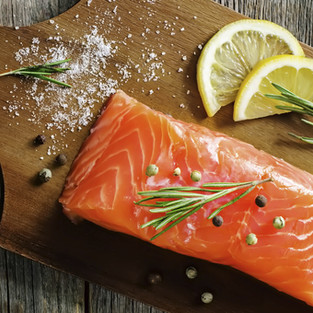Let's Talk About Protein!
- Jamie McDermott

- Nov 19, 2019
- 3 min read
Updated: Jan 20, 2020

We've all probably heard about the benefits of protein - but depending on where the information is coming from, there may be some conflicts and/or confusion. In my 15 years of nutrition counseling - of which a large portion has been directed towards diabetes and weight management - I've been able to validate what the science says (1,2), which is that a higher protein intake is more beneficial for fat loss and metabolic health (blood sugar, HDL cholesterol, triglycerides, blood pressure, and waist circumference), versus a high carbohydrate diet.
Protein also helps you to stay full for hours, which is important to overall happiness and success when making any changes to your nutrition and lifestyle habits - and that is my ultimate goal.
Now, this does not mean that I tell my patients go hog wild and eat as much bacon and sausage as they want - that would be too good to be true, wouldn't it? :) It simply means that I recommend the consumption of a consistent, regular intake of high quality protein foods throughout the day. Depending on the person's goals (performance nutrition, weight loss, blood sugar control, or even weight gain), we pair the protein with some type of carbohydrate and fat. The types of carbohydrates and servings sizes will vary based on that person's unique needs.
Let's learn a little more about the various types of protein, shall we?
Complete vs Incomplete Proteins
All proteins are made up of amino acids, which are critical for many bodily functions such as producing hormones, muscle synthesis, and supporting the immune system. 9 of these amino acids have been categorized as "essential", which means that they can't be made in the body and must be consumed via foods.
Some foods (plant based proteins) are known to contain incomplete proteins, which simply means that they do not contain all of the amino acids. As long as someone is consuming a well balanced diet (even if they don't eat any animal products), they usually consume all 9 amino acids over time. So, you don't need to combine beans and rice anymore if that's not yo thang.
Foods with complete proteins (mostly in animal products) contain all 9 essential amino acids. The three plant based exceptions to this are soy, quinoa, and buckwheat. These foods also contain complete proteins. Its important to note that some individuals are sensitive to soy; also, quinoa and buckwheat contain high amounts of carbohydrate per serving compared to animal proteins such as eggs or poultry (more on this later!).
Other scientifically proven health benefits of adequate high quality protein:
It results in a greater appetite reduction compared to similar portions of carbohydrates and/or fat
When (enough) protein is consumed at breakfast, hunger decreases later in the day
Protein helps to maintain muscle mass and encourage fat (vs muscle) loss as part of a weight reduction plan
It has the highest thermic effect after eating - which simply means that your body burns more calories digesting protein than any other macronutrient (20-35% compared to 5-15% for carbohydrate and fat)
The amino acids in protein help athletes recover faster from intense exercise
It also prevents acceleration of age related muscle deterioration (also known as sarcopenia)
Helps to control metabolic disorders such as insulin resistance, high triglycerides, and diabetes
Among many more!
Protein content of various foods
Now for the fun part! Let's take a closer look at some common sources of plant and animal sources of protein, and how they compare in protein and calorie content. I'm going to use standard serving sizes for all animal proteins, which is 3oz. For plant proteins such as beans, I will use the standard serving of 1/2 cup. Nuts and seeds will be listed in 1 oz servings.
Animal Proteins
Salmon, 3 oz: 22g protein, 155 calories
2 eggs: 12g protein, 142 calories
Lean beef, 3 oz: 26g protein,158 calories
Skinless chicken, 3 oz: 28 g protein,141 calories
Plain, nonfat Greek yogurt, 3/4 cup: 18g protein, 100 calories
Hard cheese, 1 oz: 7g protein, 100 calories
Plant Proteins
Cashews, 1 oz: 4g protein, 162 calories
Impossible (plant based) burger, 3 oz: 14g protein, 180 calories (had to include this!)
Firm tofu, 3 oz: 9g protein, 71 calories
Quinoa, 1/2 cup: 4g protein, 111 calories
Chickpeas (garbanzo beans), 1/2 cup: 7g protein, 134 calories
Chia seeds, 1 oz: 5g protein, 138 calories
I usually recommend that my clients consume a serving of protein at each meal, and additional protein if needed at snacks. How do your favorite foods stack up? Do you think you are getting enough high quality protein every day?
Lastly, for those of you wondering about all of the recent hype regarding the Impossible Burger and Beyond Meat, I am definitely going to offer my thoughts in the near future. Hint: I am not running to BK! :) Stay tuned, and have a productive rest of the week!





























Comments